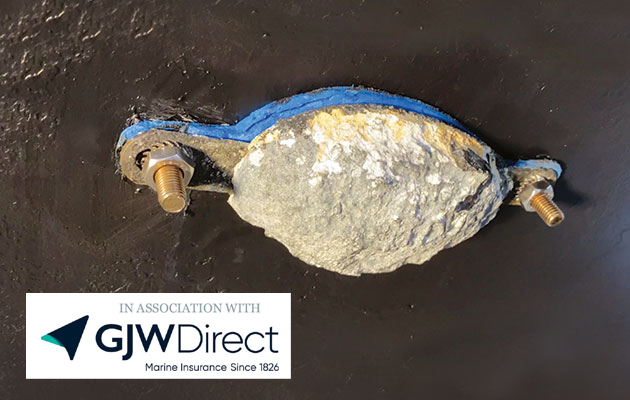Sailors are being urged to switch their zinc anodes for aluminium ones when protected their boats this season
Zinc anodes have been used by sailors for decades to protect underwater metals on boats from electrolysis, but aluminium is a better option, according to a campaign being coordinated by the Clean Harbours Partnership.
Using an evidence-based approach, the CHP sites new research by Portsmouth University about the impact of accumulations of metals in marine sediments on the natural environment. Zinc contains cadmium, which is toxic to marine life, and enters the food chain through these sediments, while aluminium does not. The metals do not degrade or decompose, but remain present in the environment indefinitely.

A typical hull anode as seen on many boats. Its effectiveness in protecting the propeller is debatable when placed as far forward as this. The white deposits of zinc oxide are inhibiting its action
“The problem is metals do not degrade. They accumulate in the ocean and in sediment on the sea bed, where organisms at all levels in the food chain ingest them. Zinc anodes also contain Cadmium, which is harmful to marine life, whereas Aluminium does not,” explains James Collings Wells of the Clean Harbours Partnership. “Whilst Aluminium anodes are being used by some of the UK’s major boat manufacturers, evidently they are not being used widely enough. We are urging boat builders and boaters across the UK to switch to using Aluminium anodes.”
The Institute of Marine Sciences at Portsmouth University calculated that approximately 900 tonnes of Zinc is released into UK coastal and inland waters by recreational vessels in an average year.
Article continues below…
How to: check and change an anode
Promotional feature in association with GJW Direct. Keeping your anodes in good order prevents serious damage on board, says Rubicon…
A guide to aluminium anodes
Protecting your boat from corrosion is something we all have to do, but what are the implications of switching to…
How to prevent corrosion on your yacht
One of the most worrying things that can happen to a boat owner is to discover vital and expensive metallic…
Aluminium has the additional benefits that it is both lighter and longer-lasting than zinc, thanks to it’s higher electro-chemical capacity, and it is still reactive enough to provide good protection of metal parts, in the brackish water found in rivers and marinas, as well as in salt water.
CHP noted that when changing anode material from zinc to aluminium, all anodes should be changed at the same time, including hull, propeller and propeller shaft, and internal engine anodes. It also advised that higher-than-expected erosion of anodes could be due to stray current from shore power, and if your boat is routinely left for periods on shore power then a galvanic isolator should be fitted.
The Clean Harbours Partnership is formed of local interest groups around Chichester and Langstone Harbours. The Partnership adopts a professional, evidence-based approach to raise awareness and influence change to the issue of harbour pollution and water quality. It has also publishedf advice on how to avoid releasing metals into the marine environment.
Enjoyed reading this?
A subscription to Yachting Monthly magazine costs around 40% less than the cover price.
Print and digital editions are available through Magazines Direct – where you can also find the latest deals.
YM is packed with information to help you get the most from your time on the water.
-
-
- Take your seamanship to the next level with tips, advice and skills from our experts
- Impartial in-depth reviews of the latest yachts and equipment
- Cruising guides to help you reach those dream destinations
-
Follow us on Facebook, Twitter and Instagram.







